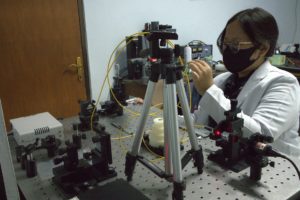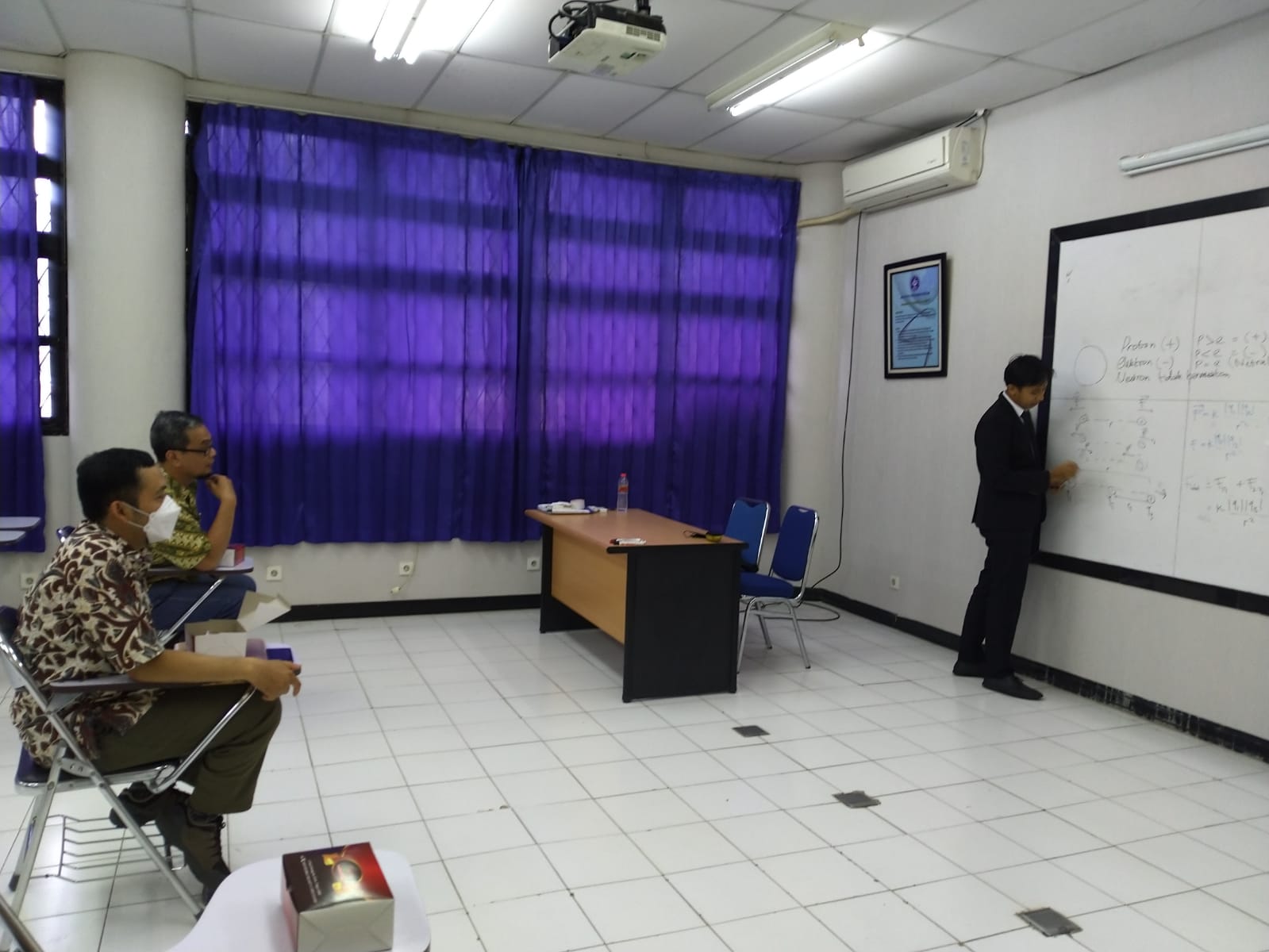Undergraduate Program

The Department of Physics, IPB University offers a comprehensive 4-year bachelor’s degree program. The graduates will be awarded a bachelor of science degree (Sarjana Sains, S.Si.) according to Indonesia`s curriculum of MBKM (Merdeka Belajar Kurikulum Merdeka) 2020 after completing 144 SKS (216 ECTS) of coursework and other type of courses, including final project.
.
.
.
Program Educational Objectives (PEOs)
To produce graduates who are capable of working professionally as researchers, educators, or industrial practitioners in physics and related fields, characterized by:
- Mastery of physics knowledge and methodology, and the ability to apply them to various fields of work.
- Mastery of the scientific method to observe, analyze, and understand various physical phenomena in the universe.
- Ability to keep up with the latest developments in physics in relation to the development of science, technology, industry, and life in general.
- Ability to communicate ideas both orally and in writing, and to take on roles and lead workgroups.
- Ability to continue studies to a higher level.
.
.
.
Program Learning Outcomes (PLO)
The program learning outcome of Bachelor of Physics Program are:
-
- Mastering the knowledge of classical physics and modern physics concepts → P
- Able to solve basic problems in classical physics using the principles of mechanics, thermodynamics, electrodynamics and waves → KK
- Able to solve basic problems in modern physics using the principles of quantum physics, atoms, molecules, nuclear, particles and solid-state physics → KK
- Able to use analytical tools including mathematical, statistical and computational methods to solve physics problems → KK
- Able to use modern measurement tools and apply the basic principles of experimentation → KK
- Able to communicate both orally and in writing in expressing ideas about problem solving and using the basic principles of classical physics and modern physics → KK
- Able to work effectively both individually and in groups → KK
- Able to apply knowledge in physics to broader fields such as life sciences → KK
- Able to meet learning outcomes in the aspect of attitude¹ and general skills² set by SN-DIKTI → S and KU
Notes:
¹ Attitude aspect: demonstrating adherence to academic values, norms, and ethics.
² General Skills aspect: able to apply logical, critical, systematic, creative, and innovative thinking.
Codes
- P = Pengetahuan / Knowledge
- KK = Kemampuan Khusus / Special Ability
- S = Sikap / Attitude
- KU = Kemampuan Umum / General Ability
.
.
.
Curriculum
Courses provided by The Department of Physics, IPB University can be categorized into:
| Courses | Requirement (credits) |
| Common Core Course (CCC) | 33 |
| Fundamental Course (FC) | 3 |
| Academic Core Course (ACC) | 36 |
| In-depth Course (IC) | 30 |
| Enrichment Course (EC) | 21 |
| Final Project (FP), Capstones (CS), Thematic-Community Service Program, Internship | 21 |
| Total | 144 |
The Common Core Courses (CCC) are basic courses including physics, mathematics, chemistry, biology, sport and arts, languages, etc. as the preparation for undergraduate courses. CCCs are taught exclusively in the first year of bachelor`s education. For more information, visit the First Year Undergraduate Program page.
List of the undergraduate courses
For the description of each course, download here
| Course Code | Course Name | Credits (Class-Lab) | Course Category |
| Semester 3 | |||
| FIS1201 | Newtonian Mechanics | 3(2-1) | ACC |
| FIS1203 | Mathematical Physics | 3(2-1) | ACC |
| FIS1205 | Analogue Electronics | 2(1-1) | ACC |
| FIS1207 | Thermodynamics | 3(2-1) | ACC |
| FIS1209 | Waves | 3(2-1) | ACC |
| FIS120B | Electrostatics | 3(2-1) | ACC |
| Subtotal Credit | 17 | ||
| Semester 4 | |||
| FIS1202 | Langrangian-Hamiltonian Mechanics | 3(2-1) | ACC |
| FIS1206 | Advanced Mathematical Physics | 3(2-1) | ACC |
| FIS1208 | Digital Electronics | 2(1-1) | ACC |
| FIS1204 | Computational Physics | 2(1-1) | ACC |
| FIS1282 | Advanced Experimental Physics | 2(1-1) | IC |
| FIS1292 | Biophysics | 2(1-1) | IC |
| FIS120C | Electrodynamics | 3(2-1) | ACC |
| Subtotal Credit | 17 | ||
| Semester 5 | |||
| FIS1301 | Quantum Physics | 3(2-1) | ACC |
| FIS1303 | Statistical Physics | 3(2-1) | ACC |
| FIS1381 | Optics and Photonics | 2(2-0) | IC |
| FIS1385 | Internet Based Instrumentation Systems | 2(1-1) | IC |
| FIS1371 | Complex Systems | 2(2-0) | IC |
| FIS1393 | Biomaterials | 2(2-0) | IC |
| FIS1383 | Material Characterization Methods | 2(1-1) | IC |
| FIS1387 | Sensors and Transducers | 2(1-1) | IC |
| Subtotal Credit | 18 | ||
| Semester 6 | |||
| FIS1372 | Solid State Physics | 3(2-1) | IC |
| FIS1374 | Theory of Relativity | 2(2-0) | IC |
| FIS137A | Advanced Quantum Physics | 3(2-1) | IC |
| FIS137C | Atomic and Molecular Physics | 2(2-0) | IC |
| FIS1386 | Nanophysics | 2(2-0) | IC |
| FIS137E | Nuclear and Particle Physics | 2(2-0) | IC |
| FIS1358 | Capstone in Physics 1 | 4(0-4) | CAP/FYP |
| FIS135A | Scientific Writing Method in Physics | 1(1-0) | CAP/FYP |
| Enrichment Course | 3 | EC | |
| Subtotal Credit | 22 | ||
| Semester 7 | |||
| IPB400 | Thematic-Community Service Program | 4(0-4) | CAP/FYP/KKNT |
| Enrichment Course | 18 | EC | |
| FIS1461 | Colloquium | 1(0-1) | CAP/FYP |
| Subtotal Credit | 23 | ||
| Semester 8 | |||
| FIS1452 | Capstone in Physics 2 | 4(0-4) | CAP/FYP |
| FIS1462 | Seminar | 1(0-1) | CAP/FYP |
| FIS1464 | Final Year Project | 6(0-6) | CAP/FYP |
| Subtotal Credit | 11 |

.
.
.
Bachelor Thesis Exam Implementation
The Final Year Project and Exam provides testing and assessment of the quality of all final project activities that have been passed by students as reflected in the form of a thesis document (Final Project) following KKNI level 6 and the Program Learning Outcomes (PLO) of the Physics Undergraduate Study Program of IPB.
Below are the implementation charts for each activity related to Final Year Project
Colloquium [English / Indonesian]
Seminar [English / Indonesian]
Final Year Exam [English / Indonesian]


